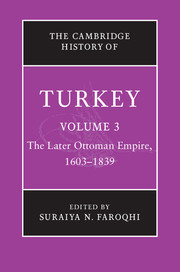Book contents
- Frontmatter
- PART I BACKGROUND
- 1 Introduction
- 2 Ecology of the Ottoman lands
- 3 Political and diplomatic developments
- PART II AN EMPIRE IN TRANSITION
- PART III THE CENTRE AND THE PROVINCES
- PART IV SOCIAL, RELIGIOUS AND POLITICAL GROUPS
- PART V MAKING A LIVING
- PART VI CULTURE AND THE ARTS
- Glossary
- Bibliography
- Index
- References
3 - Political and diplomatic developments
from PART I - BACKGROUND
Published online by Cambridge University Press: 28 March 2008
- Frontmatter
- PART I BACKGROUND
- 1 Introduction
- 2 Ecology of the Ottoman lands
- 3 Political and diplomatic developments
- PART II AN EMPIRE IN TRANSITION
- PART III THE CENTRE AND THE PROVINCES
- PART IV SOCIAL, RELIGIOUS AND POLITICAL GROUPS
- PART V MAKING A LIVING
- PART VI CULTURE AND THE ARTS
- Glossary
- Bibliography
- Index
- References
Summary
Ottoman political history of the seventeenth and eighteenth centuries is curiously under-researched. On the other hand, this sub-field of Ottoman studies was the first to receive systematic expert interest in Catholic and Protestant Europe. Moreover, Ottoman historiography also excelled in this domain. Paul Rycaut, Demetrius Cantemir, Mouradgea d’Ohsson and even the young Joseph von Hammer all treated the empire as a contemporary polity with a meaningful and functioning administrative structure. They tended to contextualise political and diplomatic affairs by reference to military matters, while military men such as Raimondo Montecuccoli or Luigi Ferdinando Marsigli discussed military problems while also showing an informed interest in politics and administration.
Cantemir and Marsigli, who were of Ottoman extraction or else had spent a considerable amount of time in Istanbul, often shared a sentiment expressed by Ottoman chroniclers and political authors – namely, that the empire was in a state of decline. This idea, partly boosted by the influence of Edward Gibbon’s History of the Decline and Fall of the Roman Empire (London, 1782–8), was to fascinate Western authors; unfortunately it was to prove detrimental to their understanding of and interest in the post-sixteenth-century Ottoman Empire.
Only in the last few decades has the paradigm of ‘Ottoman decline’ been subjected to criticism. This debate has been informed by neo-Marxism, post-linguistic-turn social science, modernisation studies and, above all, the debate triggered by Edward W Said’s Orientalism (1978); however, Said himself had considerable difficulty when it came to dealing with the Ottomans.
- Type
- Chapter
- Information
- The Cambridge History of Turkey , pp. 44 - 62Publisher: Cambridge University PressPrint publication year: 2006
References
- 3
- Cited by



